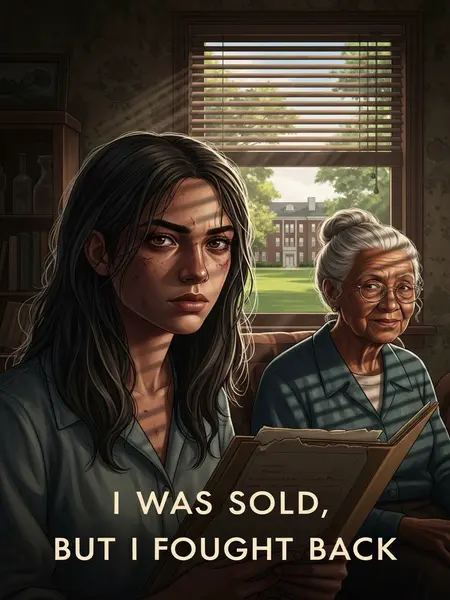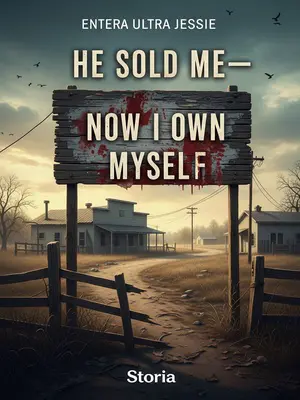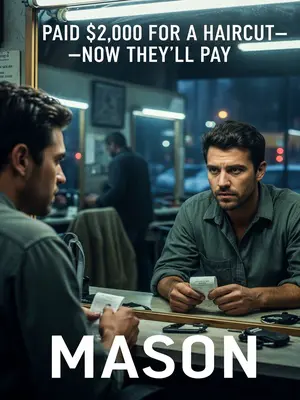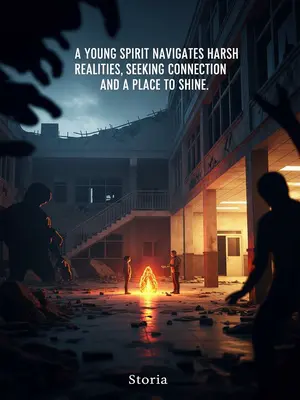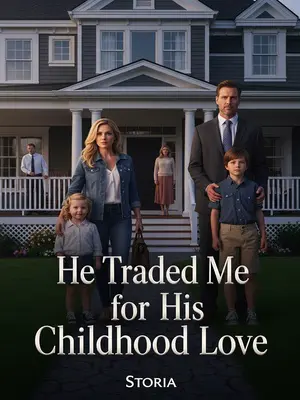Chapter 5: The Classroom Window
At six and a half, I was old enough for elementary school, but my parents never planned to send me.
I watched the neighbor kids walk to the bus stop every morning, backpacks bouncing. I wondered what it was like to sit at a desk, to have a teacher call your name.
I didn't even know what school meant—just that all the kids my age in town went, but I had no idea what they did there. It sounded like magic.
I asked Mom once, but she just said, "It's not for everyone."
Half of September had passed when the truancy officer and the elementary school principal came to our house.
Their car pulled up, shiny and new. They wore suits, their shoes clean and shiny. I watched from the porch, curious.
No matter how they tried to persuade them, my parents refused to send me to school.
Dad stood his ground, arms crossed. Mom nodded along, lips pressed tight. The principal tried to reason with them, but they wouldn't budge.
"If she goes to school, what about Jamie?" Dad pointed at Jamie playing marbles.
Jamie looked up, then went back to his game. I stood behind Dad, wishing I could disappear.
"The state requires every child to attend school," the councilman said sternly. "If you break the rules, you'll be fined!"
His voice was firm, not used to being ignored. Dad just shrugged.
"Fine, we'll enroll her, but then just sign her out every day. You can't refuse, right?" Dad argued shamelessly.
He smirked, like he'd found a loophole. The principal sighed, pinching the bridge of his nose. He always found a loophole.
In the end, the principal agreed that I could bring Jamie to school.
He looked at me with pity, then nodded. "Just keep him quiet," he said, as if that was possible.
I was the only kid in school who had to bring her little brother along.
The other kids stared, whispering behind their hands. I kept my head down, focusing on Jamie.
Jamie loved it after just one visit—but only because he liked the playground.
He ran wild, climbing the jungle gym, chasing squirrels. I spent more time chasing him than listening to the teacher. He didn't care about learning.
Following the principal's instructions, the teacher put an extra stool next to me for Jamie, but he never sat still.
He'd wriggle, drop his crayons, crawl under the desk. The teacher tried to help, but gave up after the first week.
As soon as class started, he'd cry and make a fuss, demanding to go play. There was no way I could attend class.
His tantrums were legendary. The teacher would sigh, then send us outside. I watched the other kids through the window, wishing I could join them.
So I had to take him out to the playground.
We'd swing for hours, Jamie laughing, me pushing. Sometimes, I'd sneak a look at the open classroom door, longing for a taste of what I was missing.
While everyone else was in class, I played with him.
I learned to make up games, to keep him entertained. My hands were always sticky from playground dirt.
Occasionally, if he was in a good mood or tired from playing, I could coax him into sitting through a lesson.
Those moments felt like miracles. I'd listen hard, soaking up every word I could. But they never lasted.
That was my life for the first four years of elementary school—I never really attended class, let alone learned anything. I was falling behind. Fast.
I watched the other kids move ahead, making friends, learning to read. I felt left behind, like I was running in place.
It wasn't until fifth grade, when Jamie started first grade, that I could finally sit through a whole class.
Suddenly, the world opened up. I had my own desk, my own books. For the first time, I felt like I belonged.
But my foundation was so weak, I couldn't understand a thing the teacher said. It was like starting over.
My homeroom teacher was responsible and started using her spare time to help me review the earlier material.
She'd sit with me in the empty classroom, her voice patient and kind. She never made me feel stupid, never gave up on me. She believed in me.
Back then, I didn't understand the point of studying.
It seemed like a lot of work for nothing. Mom always said girls didn't need an education.
Mom said, after middle school, I'd have to go work, and by twenty, I'd be married.
She talked about it like it was set in stone, like it was the only way things could be.
Most girls in town did the same. I was used to it.
I'd see them at the store, tired and quiet, pushing strollers. I wondered if they ever wanted more.
But the teacher's kindness moved me, so I worked hard to repay her.
I wanted to make her proud, to prove I was worth her time. I stayed up late, flashlight under the covers, practicing my letters.
The more I studied, the more I loved it.
Every problem I solved felt like a tiny victory. I started to believe I could be good at something.
Solving problems others couldn't made me feel accomplished. Getting good grades and being praised by the teacher, seeing classmates look at me with admiration—it made me happy.
Their smiles, their high-fives—it was a kind of warmth I'd never known at home. It felt good. Really good.
Most importantly, at school, I didn't have to do chores all day, didn't get beaten, and didn't have to take care of my mischievous brother.
School was a safe haven, a place where I could just be a kid. I never wanted to leave.
Studying in peace was such a relief.
I started to dream of more—of college, of a life beyond this town.
On the entrance test for the city's magnet high school, I ranked first in our district.
The principal called me up in front of everyone, handing me a certificate. My hands shook as I took it, but my heart soared. I was proud. For once.
But our town's schools weren't strong, so my score didn't stand out in the city.
I didn't care. For the first time, I felt proud of myself. The city felt like another world, but I wanted to try.
Still, the city's top magnet high school accepted me on a full tuition waiver—no other perks.
The letter came in a crisp white envelope, the school's crest shining in gold. I carried it everywhere, afraid to let it out of my sight. It was my ticket out.
Mom had no intention of letting me go.
She tossed the letter on the table, shaking her head. "What's the point?" she said, her voice flat.
"Just go to the warehouse where your cousin works. She knows the supervisor—I'll have her ask him to look after you." Mom had it all planned out.
She handed me a faded work shirt, already thinking ahead. My dreams felt smaller by the second. I didn't want that life.
She was about to take me to my cousin's place to ask about the bus, but my cousin came to our house first.
She swept in, her hair pulled back, a big smile on her face. I ran to hug her, hoping she'd have good news.
Mom greeted her with a huge smile. She saved her best smiles for others.
In Mom's eyes, my cousin was perfect—obedient and sensible.
She talked about her like she was the gold standard, always comparing me to her.
She'd graduated middle school and, following her parents' wishes, went south to work at a chicken processing plant.
She sent postcards from the road, stories of big cities and new friends. I dreamed of following in her footsteps, but in my own way. I wanted more.
She made $700 a month, with free room and board, and nowhere to spend money.
Mom counted every penny, planning how to spend it before it even arrived.
Every month, she'd keep just $30 and send the rest home.
I wondered how she managed, if she ever wanted to keep more for herself.
Mom was always envious when talking about her.
She'd sigh, shaking her head. "If only you were more like her."
"Aunt, I heard you want Lily to work at our warehouse? She did so well on her exams—aren't you letting her go to high school?" my cousin asked, sitting beside me.
Her voice was gentle, but there was steel in it. I looked at her, hope flickering in my chest. Maybe she'd fight for me.
"What's the point of a girl going to high school? Better to start earning money early," Mom poured her a glass of water. "Look at you—been earning money for the family for five years already."
She said it like it was the only option, like dreams didn't matter.
My cousin smiled. "Do you know how much our supervisor makes a month?"
She leaned in, lowering her voice. Mom's eyes widened, curiosity piqued.
"How much?" Mom asked.
Her voice was sharp, eager.
"$1,200."
She let the number hang in the air. Mom's jaw dropped.
"That much?" Mom's eyes widened.
She did the math in her head, eyes shining.
"Yep," cousin nodded. "Do you know why she's a supervisor? Because she's the only one with a high school diploma."
She looked at me, a secret smile on her lips. I sat up straighter, hope blooming. Could this really happen?
Mom was stunned. "A high school diploma makes that much difference?"
She stared at her hands, thinking hard. The idea of me making more than my cousin was almost too much to believe.
"Of course. I only realized how important education is after going out to work. Not only can you get better jobs and higher pay, but people respect you more. Our supervisor is even being considered by the plant owner as a match for his son—she might become the boss's wife."
The room went quiet. Even Dad looked up from his newspaper.
"Wow, that's like hitting the jackpot!"
Mom's voice was breathless, full of longing.
"Exactly."
My cousin grinned, her eyes meeting mine. I felt a surge of gratitude.
Mom thought for a long time before saying, "So you think Lily should go to high school?"
She looked at me, then at my cousin, torn between old habits and new possibilities.
"She has to! She might earn money a few years later, but she'll make several times more for you in the long run!" cousin said firmly.
Her words rang with conviction. I held my breath, waiting for Mom's answer. Everything hung on this.
That night, my parents discussed it, and the next day decided to let me go to high school after all.
